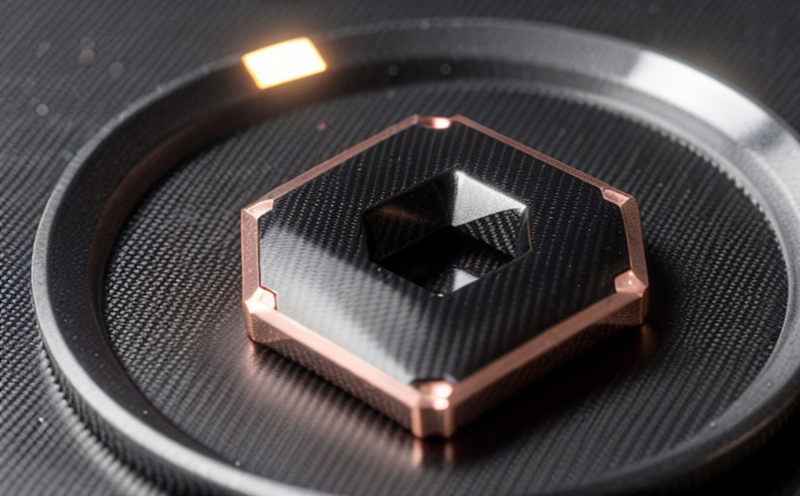ISO 7784 Abrasion Resistance of Graphene Coatings
The ISO 7784 standard provides a method to determine the abrasion resistance of coatings. This is particularly relevant for carbon nanomaterials, especially graphene, as these materials are often used in protective and functional coatings across various industries such as automotive, aerospace, and electronics.
Graphene, a single layer of carbon atoms arranged in a two-dimensional honeycomb lattice structure, possesses exceptional mechanical properties. Its high strength-to-weight ratio and excellent thermal conductivity make it an ideal candidate for enhancing the durability of coatings used in demanding environments.
The abrasion resistance test according to ISO 7784 is critical for ensuring that graphene-based coatings can withstand the wear and tear they are expected to encounter during their intended use. This test helps manufacturers verify the performance of their products under real-world conditions, thereby enhancing product reliability and customer satisfaction.
Preparation of specimens for this test involves coating a standardized substrate with the graphene-based material to be tested. The coated sample is then subjected to an abrasive action using a specified instrument and force. The rate of mass loss during this process determines the abrasion resistance of the coating.
The methodology outlined in ISO 7784 ensures consistency and repeatability, making it suitable for both research and quality assurance purposes. This standard plays a pivotal role in ensuring that graphene coatings meet industry-specific performance criteria, thereby facilitating trust between manufacturers and end-users.
Understanding the abrasion resistance of graphene coatings is crucial not only for enhancing their longevity but also for optimizing production processes. By adhering to ISO 7784 standards, manufacturers can ensure that their products are robust enough to withstand harsh environmental conditions without compromising on performance.
Scope and Methodology
The scope of the ISO 7784 standard includes the determination of abrasion resistance for coatings using a specified instrument. This method is applicable to various types of coatings, including those based on carbon nanomaterials like graphene.
- Preparation of Specimens: Coating substrates with the material under test.
- Abrasion Test Setup: Using an abrasive wheel or similar device to apply a specified force against the coated surface.
The methodology involves measuring the mass loss of the coating after exposure to the abrasive action. This is typically done using precision scales and comparing it with initial measurements taken before testing begins.
The test setup includes specific parameters such as the type of abrasive material, the speed at which it is applied, and the force exerted during the process. These factors are crucial in ensuring that the results obtained are relevant to real-world applications.
By adhering strictly to these procedures, laboratories can provide accurate and reliable data on the abrasion resistance of graphene coatings. This information is invaluable for quality managers and compliance officers who need to ensure that their products meet stringent performance standards.
Industry Applications
| Industry Sector | Application Details |
|---|---|
| Aerospace | Enhancing the durability of structural components in harsh atmospheric conditions. |
| Automotive | Improving the wear resistance of body panels and undercarriage parts. |
| Electronics | Protecting sensitive electronic circuits from mechanical damage during manufacturing processes. |
| Bioengineering | Increasing the longevity of medical devices in high-wear areas like orthopedic implants. |
- Aerospace: The abrasion resistance test ensures that coatings used on aircraft parts can withstand the abrasive effects of sand and other debris during flight.
- Automotive: Ensuring that coatings applied to car bodies and undercarriages can resist wear caused by road conditions and environmental factors.
The abrasion resistance test is essential for ensuring that graphene-based coatings meet the stringent performance requirements of these industries. By adhering to ISO 7784 standards, manufacturers can ensure their products are robust enough to withstand harsh environments without compromising on performance.
Eurolab Advantages
At Eurolab, we offer comprehensive testing services for graphene coatings using the latest technology and experienced personnel. Our facilities comply with international standards, ensuring accurate and reliable results every time.
- Expertise: Our team of specialists has extensive experience in nanomaterials testing.
- Technology: Equipped with state-of-the-art equipment that meets the highest industry standards.
We provide detailed reports and insights into your product's performance, helping you make informed decisions about your research and development processes. Our commitment to quality ensures that our clients receive accurate results that they can trust.
With Eurolab, you get more than just testing services; we offer a full suite of support services tailored to meet your specific needs. From initial consultation to final report delivery, our goal is to provide you with the best possible service and support.





